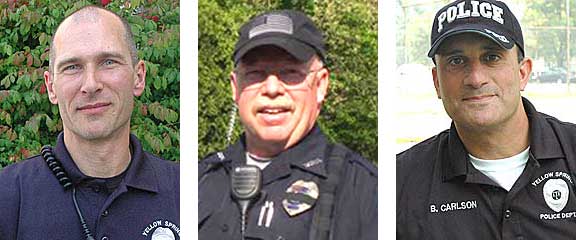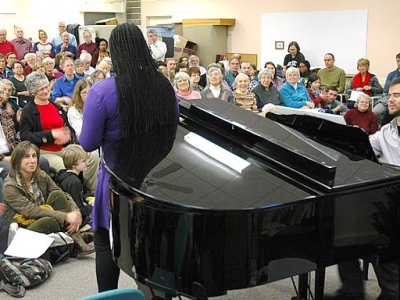Three candidates vie for Yellow Springs police chief
- Published: May 25, 2017
Three candidates are in the running to become Yellow Spring’s next chief of police. Interim Chief Brian Carlson, Officer Dave Meister and Officer Timothy Spradlin have all applied for the position of permanent chief, which has been open since former Chief Dave Hale resigned four months ago.
Hale left the post in response to police actions on New Year’s Eve that many villagers found hostile and overly aggressive. Carlson was appointed interim chief in late January.
Only internal candidates are being considered for the police chief position, which was posted internally for a week, closing May 10. Village Council decided to limit the search to internal candidates after several discussions about whether to conduct a national search or an internal search. While some citizens, particularly those involved with the 365 Project, favored a national search to compare local and nonlocal candidates, Council ultimately opted at its May 1 meeting to pursue a timely internal search. Previous nonlocal candidates have not been a good fit for Yellow Springs, Council member Marianne MacQueen noted at that meeting.
Council interviewed the three candidates in executive session Tuesday, and citizens will have a chance to ask questions and offer input at a public forum scheduled for Tuesday, May 30, at 7 p.m. at Council chambers in the Bryan Center. Each police chief candidate will make a brief presentation, followed by citizen questions. Villagers unable to attend may email questions in advance to Village Manager Patti Bates at pbates@vil.yellowsprings.oh.us. A meet-and-greet with the candidates will follow the forum.
Bates will make the hiring decision based on Council advice and citizen input within five days of the public forum, according to Council President Karen Wintrow at Council’s May 15 meeting.
The News spoke with each of the candidates last week regarding their priorities for the department, response to local citizen reform efforts and views on policing.
Brian Carlson
In his nearly four months as interim chief, Carlson has sought changes in local police training and policing style — areas he’ll continue to prioritize if he’s chosen for the permanent position, he said last week.
Specifically, he’s initiated de-escalation training and implicit bias training, as well as ensuring that all local officers receive 40 hours of Crisis Intervention Team, or CIT, training. These training areas followed recommendations from citizen groups including the Justice System Task Force, or JSTF, and the 365 Project, but also reflect his own outlook on policing, Carlson said.
“My vision of policing is a nonviolent type of policing,” he said. “It’s about caring for the community.”
Carlson said he has appreciated the input from citizen groups, and is in favor of recent JSTF recommendations to increase use of Mayor’s Court and add a social worker to the police department.
A relative latecomer to police work, Carlson entered the police academy at age 48, and began as a full-time officer in the Yellow Springs police department under former Chief John Grote in 2011. Grote’s “soft policing” approach matched his own sensibility, Carlson said, including prioritizing interactions with youth and being visible in the community. For example, Grote was known for greeting students before school outside local schools, and Carlson as interim chief has done this, too.
“I look forward to it every morning,” Carlson said.
In an interview four months ago when he began as interim chief, Carlson acknowledged a rift in the relationship between villagers and local police. He said last week that police are working to improve that relationship “one interaction at a time,” with an emphasis on creating positive encounters and de-escalating tense situations.
As permanent chief, he would increase patrol officers’ presence in the community outside their vehicles, and encourage engagement with local citizens. “If we don’t engage, we’re an occupying force,” he said. And he would expand training to cultivate officers’ empathy and social and emotional skills, including increasing their awareness of the impact of police work on their own mental and emotional health.
Asked why he seeks the position, Carlson said he enjoys making a difference through policing, and especially enjoys policing in Yellow Springs.
“I genuinely love this town and its people. That’s a big plus,” he said.
Carlson has served the Yellow Springs police department since 2011. Initially hired full time, he was assigned to the ACE Task Force in 2014, but didn’t enjoy the work and resigned as a full-time officer two months later. He served as a part-time officer until his recent appointment to interim chief.
Carlson’s prior work experience includes the ownership of two carpentry-related small businesses, Opera Portables and CJ Bryson, Inc. He remains active in CJ Bryson, which does architectural interior modeling. Carlson attended Western Kentucky University and the University of Cincinnati, studying music and philosophy.
Carlson, 54, is married with two children and lives in Xenia Township.
Dave Meister
The longest-serving of the three candidates for chief, Meister joined the local force in 2010, also under former Chief Grote, after he and his family relocated to Yellow Springs from Washington state. He is the only candidate who lives in Yellow Springs, which he said he believes is an asset in local policing.
“You get to know the community in a different way. It’s that much easier to be involved if you live here,” he said.
Partly because of his residence in the village, Meister said he has a “unique understanding” of Yellow Springs’ policing needs. Because the local crime rate is low, police have an opportunity to focus their efforts on solving community problems and improving quality of life, he said.
“I envision the police department as a liaison connecting citizens with different resources. We’re here 24/7,” Meister said.
Similar to Carlson, he is in favor of the JSTF recommendations to add a social worker to the department and to expand Mayor’s Court use, which he said helps the community solve problems at a local level.
“I’ve always been an advocate for Mayor’s Court. It’s a win-win for everybody,” he said.
As chief, he would take steps to improve police responsiveness to citizens. For example, he would organize “town meetings” to gather citizen input. Groups like the JSTF and the 365 Project are important, he said, but police also need to hear feedback directly from a range of villagers. In addition, he would modify the existing citizen complaint system to make it less formal and intimidating so as to invite in more feedback.
And Meister would seek to address high levels of department turnover by refocusing hiring practices on recruiting and retaining officers who want to police in Yellow Springs, as well as working to transition new hires’ policing style to match the village’s desire for a community-minded, collaborative approach.
“We have a unique opportunity in the village to create a progressive policing department,” he said.
A full-time officer with the local department since late 2010, Meister applied for a sergeant position in 2012 and again in late 2016. (The 2016 sergeant search was put on hold following the New Year’s Eve incident.) He also applied for the permanent chief position in 2014. Since 2012, he has served the department as a field training officer, helping to train about a dozen officers hired onto the local force.
Meister has a bachelor’s degree in biology from Evergreen State and worked as a state biologist for the Washington Department of Fish and Wildlife for 10 years prior to moving to Yellow Springs. He also worked part-time as a police officer in the Seattle suburb of Arlington for three years.
Meister, 48, is married and lives with his wife and four children in Yellow Springs. He is a volunteer with Miami Township Fire and Rescue.
Timothy Spradlin
Spradlin has been a part-time officer in Yellow Springs since 2014. A former military police sergeant, Xenia Township firefighter and fire chief and state arson investigator, among other roles, Spradlin is seeking the job as chief because he cares about people in the local department and the village, he said last week.
“I believe in keeping the peace and keeping everyone safe,” he said.
Regarding recent tensions between villagers and police, he said he views the relationship as a “two-way street” in which both parties share responsibility for improving communication and understanding.
“The community also needs to better understand the police — what it means to be a sworn officer,” he said. Police don’t have the discretion to not enforce laws that some villagers might not favor, such as marijuana laws, he said.
“Police don’t have that power,” he said.
However, he emphasized that local police work hard to “handle things at the lowest possible level,” for example giving speeders within 10 miles of the speed limit a warning rather than a ticket.
“We enforce at the lowest level to protect the community and our own integrity,” Spradlin said.
While less familiar with the specific recommendations made by the JSTF, he said he agrees with the policing vision statement recently put forth by the 365 Project. That statement includes the principle of police acting without bias and being “proactively fair and impartial.” Spradlin said he follows the “hot stove theory” of policing, which holds that police should treat everyone who breaks the law (touches the “hot stove”) in the same way.
Spradlin said he believes bias and prejudice can go both ways, with officers holding negative stereotypes about community members, and some community members responding negatively to “the guy dressed in blue.”
“Police don’t like bias and prejudice either,” he said.
As chief, one of his first priorities would be to do a “climate assessment” with each officer in the department as well as key stakeholders in the community to determine where problems, conflicts and misperceptions exist. Regarding incorporating recommendations from the JSTF and other citizen groups, he said he would “sit down with each individual issue” and review its ramifications for the department.
Spradlin has served as a police academy instructor at Sinclair Community College since 2004. He also conducts training seminars with organizations on how to respond to active shooter scenarios. An Iraq war veteran who retired in 2008 after 40 years of mostly reserve service in the US Air Force, Spradlin is active in veteran causes, including serving on the Greene County Veterans’ Service Commission. He holds a bachelor’s degree in organizational management from Wilberforce University, and is a certified community service chaplain.
Spradlin, 57, is married with four children and lives in Xenia Township.
The Yellow Springs News encourages respectful discussion of this article.
You must login to post a comment.
Don't have a login? Register for a free YSNews.com account.
Parkinsons.jpg)














No comments yet for this article.